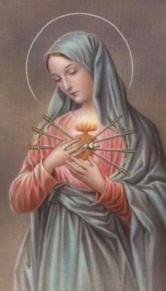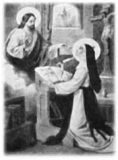The Burning of Blessed Candles is Beneficial
To the Suffering Souls
 Under the Christian dispensation the use of lights was retained not only when the sacred mysteries were celebrated at night during times of persecution, but also during the day. In the early Church those selected to take care of the lamps and candles were specially ordained for this purpose. This minor order of acolytes is still conferred by the Church. And because candles and lamps are used at divine service, the Church blesses them. The burning lamp or candle signifies Christ, the eternal Light, which we implore in our prayers to shine upon the departed. At the same time they are also a continue admonition for the living to remember their deceased brethren; they are an alms for the Suffering Souls symbolizing charity; for as the flame gradually consumes the blessed candle, thus charity reduces the torments of the purifying fire. St. Anthanasius lays great stress on this pious custom. He says, “Though the deceased is buried in the earth, thou must not omit to burn oil and wax on his grave, for this is pleasing to God and merits great reward. Oil and wax are an offering, the Holy Sacrifice is a propitiation, and alms given to the poor is an increase of recompense.”
Under the Christian dispensation the use of lights was retained not only when the sacred mysteries were celebrated at night during times of persecution, but also during the day. In the early Church those selected to take care of the lamps and candles were specially ordained for this purpose. This minor order of acolytes is still conferred by the Church. And because candles and lamps are used at divine service, the Church blesses them. The burning lamp or candle signifies Christ, the eternal Light, which we implore in our prayers to shine upon the departed. At the same time they are also a continue admonition for the living to remember their deceased brethren; they are an alms for the Suffering Souls symbolizing charity; for as the flame gradually consumes the blessed candle, thus charity reduces the torments of the purifying fire. St. Anthanasius lays great stress on this pious custom. He says, “Though the deceased is buried in the earth, thou must not omit to burn oil and wax on his grave, for this is pleasing to God and merits great reward. Oil and wax are an offering, the Holy Sacrifice is a propitiation, and alms given to the poor is an increase of recompense.” The tombs, particularly those of the martyrs and saints, were adorned even at the time of the early persecutions. Hence St. Thomas, with St. John Damascene, declared that oil was among the gifts offered in early times for the relief of the departed. In the middle ages the custom prevailed and in certain countries, for instance in Southern Germany, has descended to our times, the custom, namely, of burning lamps on the graves throughout the year, or at least during certain seasons of the year. The Church sanctions this pious practice by recognizing provisions for this purposes, and by burning numerous lights at all her solemnities. This custom is observed particularly in places of pilgrimage, in convents, etc., where a number of lamps are kept burning day and night during Triduums or Novenas for the souls in Purgatory.
Finally, examples are not wanting to prove that this pious custom is acceptable to the souls in Purgatory, and legendary lore knows of touching incidents showing that God Himself sometimes gave evidence of His approval of this practice. A lamp at the tomb of St. Thomas the apostle continued burning during the fiercest storms, sometimes even after the oil was consumed. The same is related concerning St. Gregory and St. Constantine. The efforts of the evil spirit to extinguish the lamps of St. Genevieve, in Paris, were ineffectual; the symbol of virginity continued to shed its light.
A deceased person appeared to a relative and complained bitterly that the customary number of candles had not been offered at his funeral. Also, that pitiful moaning was heard in a house where it had been neglected one Saturday to light the customary “Poor Souls’ Candle.” A priest vouches for the following which he related to the author: A peasant of his acquaintance attempted during three nights to steal fruit from his neighbor’s orchard. Every time he came near the place, a light either came toward him, or moved in a circle around the house. Later he confessed his guilt to the owner, observing that the latter must have a vigilant guard. The man replied that he knew of no guard, except that it was his custom to burn a candle every evening for the Suffering Souls, and that these grateful spirits must have guarded his property.
(taken from Charity for the Suffering Souls
by Tan Books and Publishers)








0 Comments:
Post a Comment
<< Home